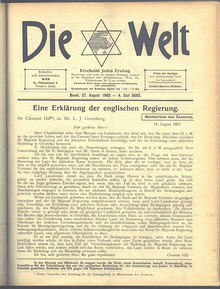The world (zionism)
The magazine Die Welt , founded by Theodor Herzl in May 1897 in Vienna , became the central organ of the Zionist movement from 1897 to 1914 .
- Edited by Paul Naschauer (de iure), Berthold Feiwel , AH Reich, Leopold Kahn, Julius Uprimny, Siegmund Werner , Nahum Sokolow , Isidor Schalit , Erwin Rosenberger, Leon Kellner , Isidor Marmorek, Jacob Klatzkin and Martin Buber ;
- Editing (including): SR Landau , Siegmund Werner, Erwin Rosenberger, Berthold Feiwel, AH Reich, Julius Uprimny, Abraham Coralnik, Julius Berger, Moriz Zobel, N. Golant, Kurt Blumenfeld from 1913 to 1914.
- Alexander Ritter von Eiss was the administrative director of "Welt" from 1897 to the end of October 1902, after Herzl had previously been stolen from or cheated by people in the administration of "Welt" (by at least 2000 guilders, probably much more). Von Eiss suppressed the fraud and was an economical and prudent administrator (his successor was: Heinrich Polturak);
- Still active in administration: Moritz Kollinsky and Adolf Pollak; responsible for shipping: Isidor Knopf.
“Die Welt” was published weekly between 1897 and 1914 by its own publishing house (Vienna / Cologne / Berlin). The circulation fluctuated strongly, but usually reached at least 3,000 and a maximum of 10,000 copies. Since 1903, the paper has been the central organ of the Zionist Organization. Reports were made about current events that affect Judaism and Zionism in general, but also about anti-Semitism or the assimilatory tendencies in Western Jewry that are regarded as dangerous.
Translations from Hebrew and Yiddish literature were intended to introduce this little-known part of Jewish culture. Another focus was the reporting on the practical colonization efforts in Erez Israel.
There was also a Hebrew ("Haolam"; cf. Alter Drujanow ) and a short-lived Yiddish edition of the world (only 1900, published weekly, also in Vienna).
In addition, a Spanish Zionist magazine ("El Progreso") was published by the Action Committee in Vienna from June 1, 1899 ( twice a month; editor: Moritz J. Cohen), which was ailing from the start and only existed for a short time.
Other Zionist papers succeeded the “Welt”: including the daily “Wiener Morgenzeitung” (1919–1927), the monthly “Palestine” (1927–1938), the weekly “Jüdische Presse” (1915–1934), Robert Strickers "The New World" (1927–1938).
“Die Welt” and the pages that follow it are completely digitized in the “Internet Archive of Jewish Periodicals” (see web links). The successor magazine appears under the title Illustrierte Neue Welt .
Web links
- The world. Central organ of the Zionist movement in the Compact Memory digitization projectat the University Library in Frankfurt am Main
- Article in the Jewish Encyclopedia
- Illustrierte Neue Welt website
Footnotes
- ^ The first issue of "Welt" then appeared on June 4, 1897; on May 14, 1897, Herzl had written to Nordau : “The Neue Freie Presse is, as it were, my legitimate wife. In the "world" I buy a maitresse - I just want to hope that it won't ruin me "
- ^ Paul Naschauer (1867-1900), brother of Herzl's wife Julie; Herzl de iure had given him the editor-in-chief of the Zionist organ “Die Welt” (which was in Herzl's possession) so as not to endanger his position in the Neue Freie Presse
- ^ Editor-in-chief and publisher of the magazine January 1, 1900 to August 31, 1901
- ↑ since 1901
- ^ Collaboration after 1904
- ^ Isidor Schalit (1871–1954), dentist in Vienna, had been an editor since 1897
- ↑ Erwin Rosenberger (1875–1966), ship's doctor at the Österreichischer Lloyd , was the editor until 1900. From July 1903 he wrote the column series "Table talks from the Café Weidhof" in Die Welt.
- ↑ took over the management on June 1, 1900
- ↑ Dr. Isidor Marmorek (1870–1906), brother of Alexander and Oskar Marmorek , Viennese lawyer
- ^ Editor 1909-1911
- ^ Editor-in-chief of the paper from September 1, 1901 as successor to Feiwel
- ^ First editor-in-chief until the break with Herzl in July 1897
- ^ Editor 1902-1904 and again 1906-1907; Topics: Russia, Yiddish language and literature, philosophy
- ↑ Moriz Zobel, 1876-1961, secretary for Hebrew correspondence in the Vienna congress office of the Zionist executive and translator of the Hebrew contributions for the "world" (until autumn 1902)
- ↑ since 1900 employee for Russian affairs
- ↑ Alexander Ritter von Eiss (1832-1915), retired Austro-Jewish officer. He was well on his way to becoming a general, but had to retire because he had not been baptized.
- ↑ Adolf Pollak (1879-1951), since 1897 in the administration of the world operates
